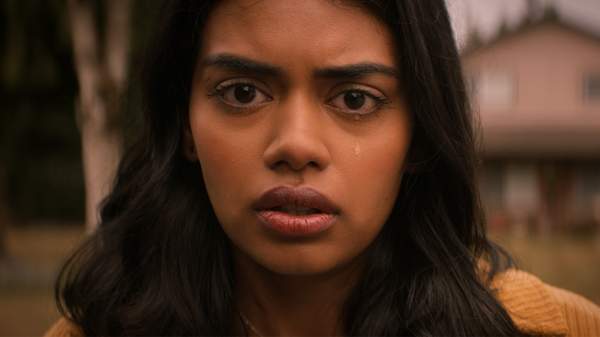Overview
What's more terrifying than standing out at high school? It Lives Inside scares up an answer. Here, fitting in with the popular kids has haunting costs — literally — as Indian American teen Samidha (Megan Suri, Never Have I Ever) discovers. Her story starts as all memorable movies should: with a sight that's rarely seen on-screen. While beauty routines are familiar-enough film fodder, watching Sam shave her arms, then use skin tone-lightening filters on her photos, instantly demonstrates the lengths that she's going to for schoolyard approval. Among the white girls that she now calls friends, she also prefers to go by Sam. At home, she's increasingly hesitant to speak Hindi with her parents Inesh (Vik Sahay, Lodge 49) and Poorna (Neeru Bajwa, Criminal). And when it comes to preparing for and celebrating the Hindu ritual of puja, Sam would rather be elsewhere with Russ (Gage Marsh, Big Sky), the boy that she's keen on.
It Lives Inside's frights don't spring from razors and social media, or from shortened names and superficial classmates; however, each one underscores how far that Sam is moving away from her heritage. Worse: they indicate how eagerly she's willing to leave her culture behind, too, a decision that's affected her childhood bond with Tamira (Mohana Krishnan, The Summer I Turned Pretty). As their school's only students with Indian backgrounds, they were once happily inseparable. Now Sam considers Tamira a walking reminder of everything that she's trying to scrub from her American identity. Keeping to herself — skulking around clutching a jar filled with a strange black substance, and virtually hiding behind her unbrushed hair — the latter has become the class outcast. So, when she asks Sam for help, of course no is the answer.
Making his feature debut after a sizeable list of shorts —and winning SXSW Austin's 2023 Audience Award in its Midnighters section with the unsettling results — writer/director Bishal Dutta loads It Lives Inside's early moments with gnawing unease. Everything that Sam is putting herself through doesn't sit cosily, nor is it meant to. Distress has been eating away at Tamira as well, as her horrified stare everywhere that Sam looks constantly makes plain. Wild and wide eyes shaped by fear and uncertainty may be one of this genre's staples, but Krishnan sports a perfectly petrified pair of peepers as she pleas for assistance. After Sam smashes the ever-grasped canister in anger, annoyance and disbelief, letting out the flesh-eating demonic entity inside, Suri joins in with her own frequently aghast eyeballs.
Casting Get Out's Betty Gabriel as a concerned teacher at Sam and Tamira's school savvily reinforces what audiences can quickly spot with In Lives Inside: this is a social thriller just like Jordan Peele's Oscar-winner (and also Us and Nope), plus everything from Sorry to Bother You and Parasite. Here, with a moniker and a central stalking force that also brings It Follows to mind, cues similarly taken from The Babadook, plus high-school humiliation that'd do Carrie proud, it's the pressure to eschew one's roots to blend in that scores the horror treatment. The supernatural presence doing the spooking is a Pishacha, which hail from Hindu and Buddhist folklore — and, as it feeds on negative vibes, its targets aren't random. Indeed, in painting a portrait of the pains that accompany being caught between the traditions of your parents' homeland and the daily reality of the only place you've ever known and its homogenous demands, Dutta gets his movie sinking its teeth in.
There's no doubting that It Lives Inside's feature filmmaking first-timer is a student of scary movies: conventions from English-language frightfests spanning decades keep peeking through. Accordingly, the plot co-penned by Dutta with Ashish Mehta (Hush Hush) does inescapably feel like plenty of other flicks, complete with being set in a Spielbergian-esque town. This film loves splashing around red hues to get nightmarish as well, and peering intently at everyone quivering in Pishacha's presence. Using alarmed and startled people on-screen to evoke the same sensations in viewers might be one of the simplest tricks in the book, but it works: empathy is one helluva horror-movie tool. Dutta understands that, and also how powerful it is to witness Sam being so visibly shaken by being trapped between her background and the Americanised ideal that she's decided is her future.
Also working swimmingly: Suri and Krishnan, who both make expressive horror stars (as, given Dutta's affection for close-ups, they need to). When Tamira disappears, forcing Sam to take her otherworldly mythology tale and its life-and-death manifestation seriously, Suri keeps adding weight to It Lives Inside's layered emotional journey. Trying to erase your heritage because you think that's the only option and then grappling with what that truly means aren't easy things to deal with, with or without confronting a monster. While many of the movie's most potent moments don't involve the Pishacha in the frame, Suri sells it all — the angst, the facade, coping with her supposed pals thinking that speaking another language is cute, the frustration over her mum's disapproval and choices since moving stateside, the realisations, and the terror and panic all included.
It Lives Inside isn't without its own chilling visual touches, though; proving that hinting works better than showing, one early altercation with the picture's boogeyman gives Dutta an instant resume highlight. And, that it's the situation and its significance rather than the actual murderous beast that lingers is 100-percent by design. Musing about immigration, displacement and conformity, and joining the ranks of culturally specific horror such as Under the Shadow and The Vigil, this is a tense and thoughtful film — even if it too, like Sam, is torn between two realms. Thankfully, the meaning that lives inside It Lives Inside gives freshness to a movie that knows it's working with a formula; filtering US teen horror through the Indian American experience is also one of Dutta's clear quests.
